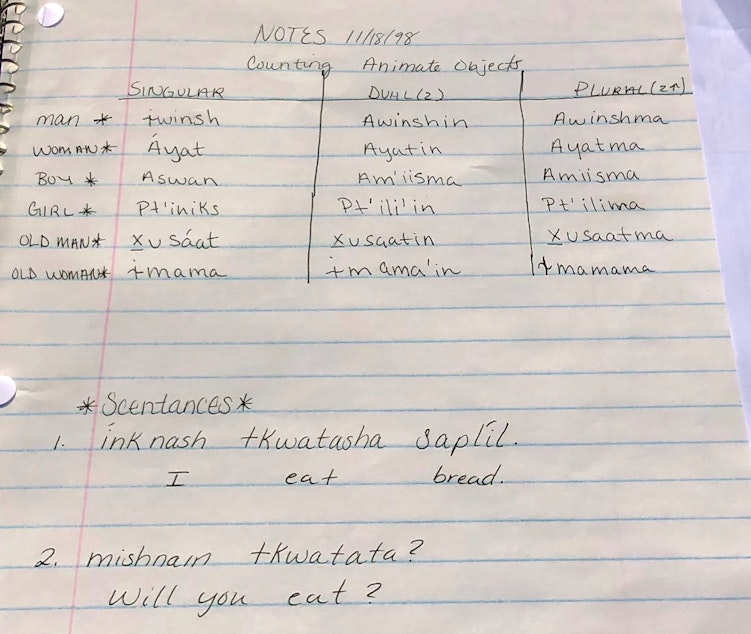'A mass casualty:' Yakama Nation tribal member reflects on devastating Covid-19 impact to her community

Covid-19 is on track to be a leading cause of death in the state by the end of the year. But the death toll is not shared proportionally among communities.
Covid-19 is killing American Indians and Alaska Natives at rates that are more than three times higher compared to white people in Washington, according to data from the state Department of Health.
Emily Washines is a Yakama Nation tribal member, historian and adjunct faculty at Yakima Valley College. She knows about a dozen people who have passed away from Covid-19, she said, including a special teacher who taught her Ichiskiin, the Yakama language.
Washines shared her experience with KUOW in the following interview, which has been lightly edited for clarity:
I
will catch myself getting ready to ask my mother about somebody and then it's like, “No, they're gone.” I've had family members pass away from coronavirus. We've had members of our community, we've had an elected official pass away from it. I’m sad most of the days and it's like I have this Wizard of Oz veil that's in front of me that's like, “Do your job, do your work. You need to pay your bills, you need to do these meetings. You need to take care of all these other people.”
Myself, I haven't participated in our ceremonies that connect with our funerals just because I want to try to be safe. I have three children here and my husband, and I've just tried to be as safe as possible. But there's an aspect of that when you have a three-day traditional ceremony usually that you can't attend and be a part of, there's a part of you that just is not fully processing who they are and their life. You have to almost continuously remind yourself that they've passed.
Sponsored
You find yourself reliving the last moments you saw them. And thinking about what they would want you to hold on to — what messages that they gave you that you would hope to want to continue on.
For example, with my language teacher that passed away, I’ve just kind of shoved that into a box and not wanted to think about. It's like in a corner of my brain if I access and think about it, it makes me teary eyed. Because she was so important to my learning and to hype me up about teaching.
As a young teenager on the reservation, we didn't even have language classes at our public high school. I had to make a policy change – now I know that's “a policy change.” But at the time, I was just, “Can I walk to the tribal school and take this language class?”
And so that's what I did, and she was there. She was one of my teachers, and to know that she's gone now is really hard because when I would see her in the community, there would be these words of encouragement. When you have this lifelong relationship with a teacher, it's just somebody that just is always encouraging you, always saying, you know, “You're my favorite student.” And I'm not going to hear that anymore.
So it makes me think, “What do I need to go do now to grow that within our community?”
Sponsored
For so many parts of the history of Natives and colonization — our Western civilization — there have been very specific policies to assimilate Natives, meaning, abandon your language, abandon your sense of self, abandon what your medicines are, your healing, what foods you know make you strong, the foods that are connected to you as a part of DNA. There's a lot of this throughout our history here in Washington State.
We look at health disparities, it's because we haven't been allowed to be who we are.
Health care issues have impacted tribes at a disproportionate rate across the board. And what we're seeing now in real time (with Covid-19) just amplifies that so much more.
You know, what we're experiencing, I'm learning, is more on the level of a mass casualty. But it's happening at a very slow pace. The amount and the range that the tribes have been impacted is something that we're going to be dealing with for a long time. And that's hard to take in. That's hard to know. But it's important because you have to kind of just take care of yourself.
That's one of our oldest teachings that we have.
Sponsored
Editor’s note: KUOW is not naming Emily Washines' late language teacher because Washines says after a Yakama tribal member passes, they are not mentioned by name during a mourning period.
KUOW is creating an online memorial to honor the lives lost in the state. Let us know here if you’d like to share the memory of someone who died from Covid-19.




